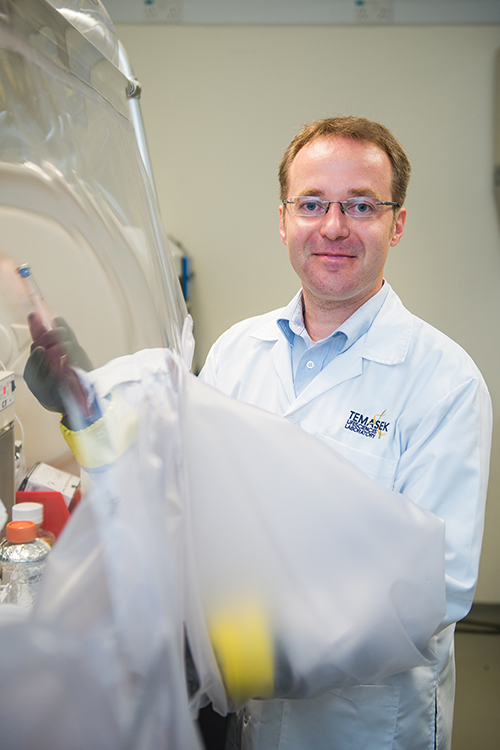
Impact
Understanding the interactions between microbes and their host, as well as between different species of microorganisms, help us develop tools that perform a targeted replacement of microbial species, improve host health and performance, as well as discover novel alternatives to antibiotics.
Collaborations, Achievements & Honours
- Led research on the first comprehensive analysis of marine fish diversity in Singapore, funded by National Research Foundation, National Parks Board, NUS and Lee Kong Chian Natural History Museum
- Collaborated on the first analysis of the microbiome of healthy Singaporeans
- Discovered new insights into the prevalence of antibiotic-resistant bacteria in the microbiome of healthy Singaporeans
Research Areas
Genome & Ecological Biology, Genetics & Genomics, Gut Microbiome
Affiliations
- Principal Investigator, TLL
- Adjunct Assistant Professor, Department of Biological Sciences, NUS
Question
How do we improve our understanding of microbe-microbe and host-microbe interaction in the mammalian gut?
Approach
Henning’s lab is interested in the biochemical and molecular characterisation of microbial isolates; diversity and function of prokaryotic and eukaryotic intestinal microorganisms; mechanisms of host-host and host-microbe interaction; as well as the selective manipulation of intestinal microbial communities.
In particular, the team is interested in understanding how specific dietary components of the Southeast Asian diet may have shaped the human gut microbiota and its constituting members.
Diet strongly influences the composition of the gut microbiota and microbiome. It has been estimated that the human gut harbours trillions of commensal bacteria. It is also increasingly recognised that these have a strong influence on human physiology and health. How microbes affect the host at a mechanistic level remains often poorly understood, but recent studies have demonstrated that some of these processes require highly specific host-microbe interactions.
Henning’s lab is currently working on the construction and characterisation of defined microbial consortia in vivo, using microbial isolates that are indigenous to the host. Looking ahead, Henning’s lab aims to develop a functional characterisation of novel human gut microbes of Singaporeans, and prototype a personalised probiotic that functions as an inhibitor of antibiotic-resistant bacteria in the human microbiome.
Henning is also working on establishing a microbial strain collection of the Asian Seabass microbiome to improve the health and performance of farmed Asian Seabass. Ultimately, he hopes to improve the understanding of microbe-microbe and host-microbe interaction in the mammalian gut.
Bio
Henning read his University Diploma at the Philipps-University Marburg and his PhD at the Max Planck Institute for Terrestrial Microbiology. He also holds an Executive MBA from Quantic School of Business and Technology and a Postgraduate Certificate in Tertiary Teaching and Learning from Massey University. He completed his postdoctoral training at the Max Planck Institute for Terrestrial Microbiology; Washington University; and AgResearch respectively. Henning joined TLL in 2015. He is currently Principal Investigator in TLL, and an adjunct assistant professor at NUS.
Principal Investigator
Henning Seedorf
The lab studies the gut microbiome of animals and humans.
Group Publications
-
Multi-omics profiling of Earth’s biomes reveals that microbial and metabolite composition are shaped by the environment
Shaffer JP, Nothias LF, Thompson LR, Sanders JG, Salido RA, Couvillion SP, Brejnrod AD, Huang S, Lejzerowicz F, Lutz HL, Zhu Q, Martino C, Morton JT, Karthikeyan S, Nothias-Esposito M, Dührkop K, Böcker S, Kim HW, Aksenov AA, Bittremieux W, Minich JJ, Marotz C, Bryant MM, Sanders K, Schwartz T, Humphrey G, Vásquez-Baeza Y, Tripathi A, Parida L, Carrieri AP, Haiminen N, Beck KL, Das P, González A, McDonald D, Karst SM, Albertsen M, Ackermann G, DeReus J, Thomas T, Petras D, Shade A, Stegen J, Song SJ, Metz TO, Swafford AD, Dorrestein PC, Jansson JK, Gilbert JA, Knight R, the Earth Microbiome Project 500 (EMP500) Consortium.28 November 2022 -
Structural and functional insights from the sequences and complex domain architecture of adhesin-like proteins from Methanobrevibacter smithii and Methanosphaera stadtmanae
Gupta AB and Seedorf H.

